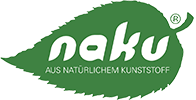
Advantages of natural polymers
Why should I buy NaKu products?
Bioplastic and its advantages
The natural plastic produced and processed by NaKu has many advantages over conventional materials. Below you can find out why you should also buy NaKu products.
NaKu is free of harmful substances
Conventional plastics can emit pollutants, such as plasticizers such as bisphenol A, into their environment. All components of the natural plastic, on the other hand, are easily degradable both in nature and in the human organism. For example, NaKu uses lactic acid, which is also found in the muscles of the human body.
Less risk for nature
Plant mining causes far less damage to the environment and upsets the circulatory system than oil extraction. In addition, there are far fewer risks to the environment if, for example, a truck loaded with sugar or starch overturns in an accident than an oil truck. The use of renewable raw materials instead of crude oil is therefore less risky for nature in many respects.
NaKu has a lower CO2 Output
Plants absorb CO during their growth2 up from the atmosphere. Natural plastic only emits the amount of CO when it is burned or composted2 released, which was previously bound by photosynthesis from the air. Compared to the combustion of petroleum products, this represents a significantly lower level of CO2 burden.
NaKu from renewable raw materials
In contrast to plastic made from petroleum, plastics made from renewable materials offer an inexhaustible source of raw materials. They can regrow within a short period of time, are grown practically on our doorstep and therefore do not require long transport routes.
NaKu can be recycled
NaKu’s preferred “End of Life” scenario is the recycling of our products. This makes the most sense, especially from an ecological point of view, and is also the path we want and need to take. Our plan is that “used” products are recycled. This means that they are collected, shredded, melted down again and processed into new granules. New products can be made from the granules obtained, for example by injection moulding, extruding or blowing. Unfortunately, the flow of material is still too small at the moment to make collecting worthwhile.
NaKu means upcycling
NaKu is working intensively on using waste materials that occur during production as a starting material for natural plastic. A new step was taken with the development of the sunflower stand: the upcycling of sunflower shells from sunflower oil production makes a sensible contribution to the use of waste products. Bioplastic based on pure waste products is a further step in the direction of waste avoidance.
Bioplastic is an additional source of income for European farmers
European agriculture is characterized by overproduction. Farmers are partly subsidized for fields lying fallow. The use of corn, potatoes and grain for the cultivation and production of natural plastics from starch offers an alternative source of income.
NaKu decomposes in nature
At the landfill, bacteria get to the natural plastic and begin to break down the starch. Depending on the film thickness, weather, temperature and number of bacteria, the bioplastic decomposition process takes eight weeks to several months. Our natural plastic becomes biomass again.
NaKu Sackerl serves as a compost bag
How do you dispose of your organic waste? Paper compost bags soak easily, leave stains and can be inconvenient for consumers to dispose of. Bags made of natural plastic hold liquid organic waste and do not soak. Knot in and off to the compost. So if your NaKu bag has become unsightly after repeated use, you can use it again as a compost bag.
NaKu Sackerl is breathable and keeps food fresh for longer
Our biogenic packaging made of natural plastic is particularly breathable. Packaged baked goods, fruit and vegetables stay fresh longer in a breathable environment and are less prone to mould. The material and manufacturing process of the NaKu bag have been perfected over the years to create an optimal climate for storing food in the bag. The taste, appearance and weight of the food are hardly changed by storage. There is reduced bacterial growth and dehydration is counteracted. You can therefore preserve the quality of the food for longer and save it from being thrown away.
NaKu Sackerl has multiple uses
NaKu bags are hard-wearing and tear-resistant. You can store them to save space and have them quickly to hand. They can be used multiple times. At the end of their life they can simply be composted. With normal plastic bags, on average only every fifth bag is used a second time. The NaKu bag is versatile. First of all, for carrying groceries and products home, just like conventional bags. After that, it can be used again and again to keep it fresh. The NaKu bag can also be washed out. Only mold should no longer come into contact with it. At the end of its life, when it has become unsightly, it can be used as a biowaste bag, rotting back into humus and breeding ground for new plants.
